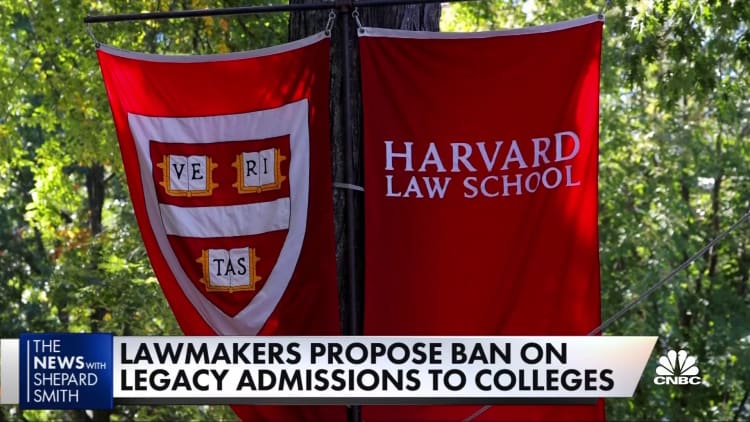
After the Supreme Court‘s judgment on the affirmative action admission policies of Harvard and the University of North Carolina, decades-old tradition choices are dealing with brand-new obstacles.
The court’s judgment was thought about an enormous blow to efforts to increase registration of minorities at American universities through policies that thought about candidates’ race.
Now, a civil liberties group is objecting to the practice of providing top priority to the kids of alumni at Harvard University, stating it victimizes trainees of color by providing an unjust increase to the mainly white kids of alumni.
” Your household’s surname and the size of your savings account are not a procedure of benefit, and must have no bearing on the college admissions procedure,” Ivan Espinoza-Madrigal, executive director of Legal representatives for Civil liberty, stated in a declaration revealing the civil liberties grievance.
Less individuals believe tradition ought to factor into admissions
Today, more Americans disagree with tradition admissions.
To that point, 75% stated whether a relative participated in the school ought to not factor into admissions choices, up from 68% in 2019, according to a report by the Bench Proving Ground
In its match versus Harvard, Attorney for Civil liberty stated it was challenging the “inequitable practice of providing favoritism in the admissions procedure to candidates with familial ties to rich donors and alumni.”
Traditions are almost 6 times most likely to be confessed, the grievance stated.
” This favoritism extremely goes to white candidates and damages efforts to diversify color,” included Michael Kippins, lawsuits fellow at Legal representatives for Civil Liberties.
Authorities at Harvard decreased to discuss the grievance.
Obstacles to tradition admissions install
A number of costs at the state and federal level have actually likewise taken objective at the practice, consisting of a current proposition in Massachusetts that would charge colleges a charge for thinking about tradition status or a candidate’s relationship to a past, existing or potential donor.
The NAACP recently contacted more than 1,600 U.S. public and personal institution of higher learnings to devote to increasing the representation of traditionally underrepresented trainees and end the practice of tradition admissions.
” That symbolizes a substantial stride towards future insurance coverage that every trainee, despite their race, ethnic culture, gender identity, sexual preference, special needs, faith, or socioeconomic status, has a level playing field to discover, grow, and prosper at a college organization,” Ivory Toldson, director of education development and research study at the NAACP, stated in a declaration.
The tradition benefit is mainly a white privilege.
Alvin Tillery
director of Northwestern’s Center for the Research Study of Variety and Democracy
” There’s no doubt that the tradition benefit is mainly a white privilege,” stated Alvin Tillery, a government teacher and director of Northwestern’s Center for the Research Study of Variety and Democracy.
Nevertheless, these choices are not based clearly on race, which identifies the practice from the obvious race-conscious admissions programs that were just recently turned down by the Supreme Court, kept in mind Don Harris, associate dean and equity, variety and addition intermediary at Temple University School of Law.
Yet, “it’s clear that they have an out of proportion influence on race,” included Harris, describing what Chief Justice John Roberts composed in his viewpoint about avoiding methods around affirmative action: “What can not be done straight can not be done indirectly.”
Tradition admissions ‘might be considered unconstitutional’
Because the practice of tradition admissions has indirect racial ramifications, these obstacles might have legal benefit, according to Jeanine Conley Daves, a lawyer at New York-based company Littler.
If there is no engaging interest for such programs and they are having an unfavorable result on the college application procedure, “then comparable to race-conscious admissions programs, it might be considered unconstitutional,” she stated.
More from Personal Financing:
Supreme Court overrules trainee loan forgiveness strategy
4 methods to prevent taking on too much trainee financial obligation
These relocations can assist you conserve huge on college expenses
” The truth is we have actually reached a respectable agreement on using identity in college admissions,” stated Tillery, who is likewise a Harvard graduate.
” If you can’t utilize race for Black and Latino trainees, then you can’t utilize race for rich white trainees either,” Tillery included.
The benefits that come from tradition admissions can be tough to measure however at a few of the most selective colleges, traditions consist of as much as 10% to 20% of the inbound class, according to information from the Associated Press. A couple of organizations, consisting of Amherst College, Massachusetts Institute of Innovation and Johns Hopkins University, have phased it out completely